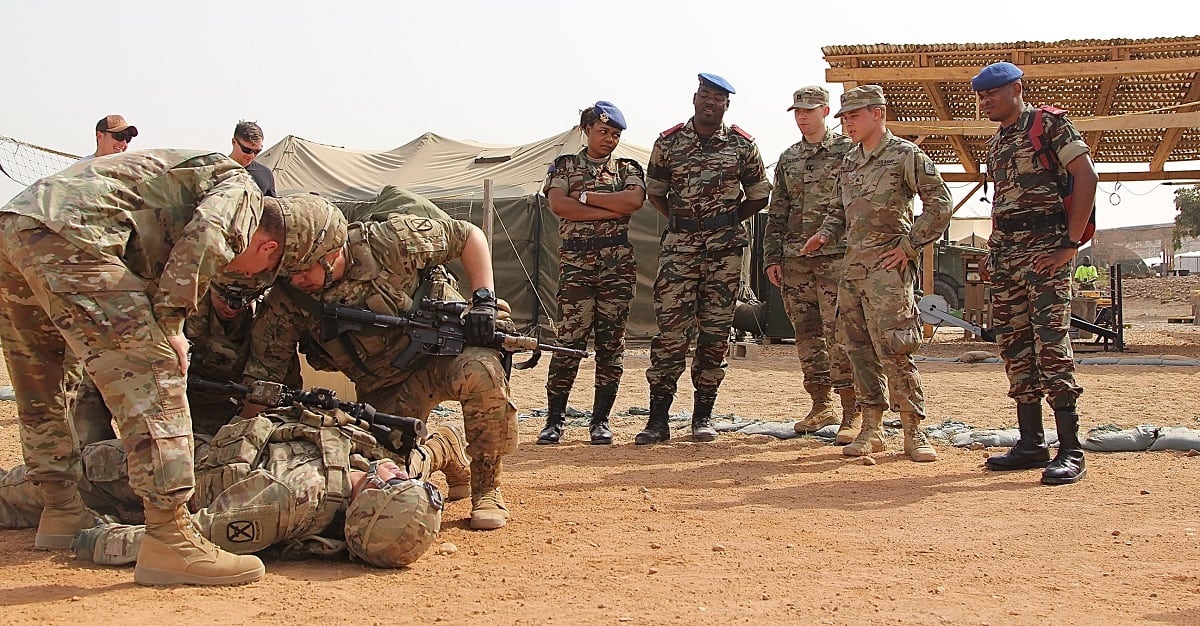WASHINGTON — U.S. Sen. Tim Kaine is accusing the military of hiding from Congress its true mission in a Niger ambush last October that ended in the deaths of four American Green Berets.
Following a classified briefing from senior Defense Department officials to the Senate Armed Services Committee, senators confirmed the fatal mission had been to “capture-or-kill” a target and not simply a training activity with local forces.
“That was a very explosive briefing,” said Kaine, D-Va. “I have deep questions on whether the military is following instructions and limitations that Congress has laid down about the mission of these troops in Africa, and I’ve had those questions, and I think this hearing raised a lot more in a pretty explosive way.”
Kaine questioned whether the legal authorization to conduct a train-and-equip missions in Niger is “a fig leaf,” and said the briefing, “raises questions about why people are hiding from us what they’re doing.”
Asked whether he thinks the military is hiding what it is doing in Niger, he said only, “Yeah.”
A military investigation into the Niger attack that killed the American service members concluded the team didn’t get required senior command approval for its risky mission to capture a high-level Islamic State militant, the Associated Press reported in March.
Initial information suggested the Army Special Forces team set out on its October mission to meet local Nigerian leaders, only to be redirected to assist a second unit hunting for Doundou Chefou, a militant suspected of involvement in the kidnapping of an American aid worker. Officials say it now appears the team went after Chefou from the onset, without outlining that intent to higher-level commanders.
As a result, commanders couldn’t accurately assess the mission’s risk, according to the officials, who spoke to AP on condition of anonymity.
North Carolina Republican Sen. Thom Tillis, whose state is home to the four Fort Bragg soldiers killed and Joint Special Operations Command, confirmed after the hearing Tuesday that there had been a failure to communicate to the chain of command the nature of the mission.
“Clearly, some things in terms of their concept of operations, they made some mistakes, and it costs our men their lives,” Tillis said, adding of military witnesses: “I think they understand it now … They readily pointed out problems and specific changes that have been made.”
There have been multiple narratives of the ambush reported. ABC News reported this week that the soldiers killed in action were part of a largely inexperienced and lightly-armed team of Green Berets and Army enablers who were outmatched by Islamic State fighters who exploited bad decisions by U.S. commanders. That team was providing backup for an separate American black ops unit that was actually hunting Cheffou.
Tillis said the briefing did not touch on whether anyone in the chain of command had been held accountable, but he expected to see whether there would be any personnel action in the coming days.
Witnesses at the hearing included Assistant Secretary Of Defense For Special Operations And Low-Intensity Conflict Owen West, Assistant Secretary Of Defense For International Security Affairs Robert Karem, Marine Corps Gen. Thomas Waldhauser, the chief of U.S. Africa Command, and Army Maj. Gen. Roger Cloutier, Africom’s chief of staff.
RELATED

Alaska Republican Sen. Dan Sullivan appeared to confirm the troops were on a “capture-or-kill” mission, and questioned why highly-trained special operations forces should be fighting in Niger when the new National Defense Strategy has marked a focus on competition with Russia and China and a shift away from counter-terror operations.
“I don’t know if we need 1,000 troops in Niger,” he said. “You have this not just a teachable moment on the tactics … but on the broader strategic approach to special operations forces to the National Defense Strategy.”
“If we’re putting our highest value trained soldiers on capture or kill missions, [the targets] should be individuals who threaten the country, our country,” Sullivan said.
Sen. Jim Inhofe, the committee’s No. 2 Republican argued the that U.S. should have dedicated troops in Africa.
“If you pull back from operations in Africa, you’re going to have a massive terrorist transition going down through Djibouti,” said Inhofe, of Oklahoma, adding: “They’re going to go where there’s least resistance, and there’s a history of that.”
SASC’s top Democrat, Sen. Jack Reed, said the committee needs to follow up in a classified and unclassified way, “To ensure we understand what was done and what any problems, operational issues, resource issues are corrected.”
Future action would have to be led by Inhofe, who is leading the committee while its chairman, Republican Sen. John McCain, fights brain cancer at home in Arizona.
South Dakota Republican Sen. Mike Rounds said the troop deaths call into question whether troops in Africa are receiving enough assets.
Sen. Jeanne Shaheen, D-N.H., said the briefing, “raises a lot of questions about future operations.” Asked if the military was changing anything as a result, she said, “Well, they say they are.”
Joe Gould was the senior Pentagon reporter for Defense News, covering the intersection of national security policy, politics and the defense industry. He had previously served as Congress reporter.







